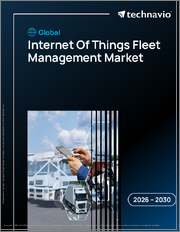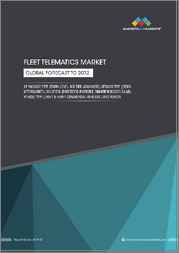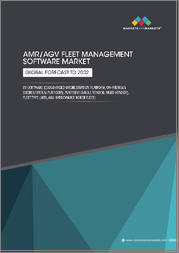
|
시장보고서
상품코드
1462638
IoT 지원 무선 차량 관리 시장 예측(-2030년)구성 요소별, 차량 유형별, 배포 유형별, 용도별, 지역별 세계 분석IoT Enabled Wireless Fleet Management Market Forecasts to 2030 - Global Analysis By Component (Solutions, Services and Other Components), Fleet Type (Passenger Fleet, Commercial Fleet and Other Fleet Types), Deployment Type, Application and By Geography |
||||||
Stratistics MRC에 따르면, 세계 IoT 지원 무선 차량 관리 시장은 2023년 1,350만 달러 규모에서 2030년에는 5,380만 달러에 달할 것으로 예상되며, 예측 기간 동안 21.8%의 연평균 복합 성장률(CAGR)을 나타낼 전망입니다.
IoT 기반 무선 차량 관리 시장은 사물인터넷(IoT) 기술을 활용하여 차량, 트럭, 선박 등의 차량 관리를 최적화하는 데 초점을 맞춘 분야로, IoT 기반 차량 관리 시스템은 차량의 위치, 속도, 연료 소비, 엔진 성능, 촉진 요소와 관련된 데이터를 수집하고 분석합니다. 촉진요인의 행동과 관련된 데이터를 수집하고 분석합니다. 이러한 정보를 통해 운영 관리자는 업무 효율성을 높이고, 연료 비용을 절감하며, 차량 유지보수를 강화하고, 규정을 철저히 준수할 수 있습니다.
2015년 아르곤 국립연구소가 실시한 조사에 따르면, 트럭의 과도한 공회전으로 인해 약 10억 갤런의 연료가 낭비되고 연간 약 30억 달러의 비용이 발생한다고 합니다.
업무 효율화에 대한 요구가 높아짐
다양한 산업 분야의 기업들은 오늘날의 역동적인 시장에서 경쟁력을 유지하기 위해 차량 운영을 최적화해야 하며, IoT 기반 무선 차량 관리 솔루션은 실시간 모니터링 및 제어 기능을 제공함으로써 기업이 차량을 효율적으로 관리하고 공회전 시간을 줄이고 연료 소비를 최소화하며 전반적인 생산성을 향상시킬 수 있도록 돕는다, 공회전 시간을 줄이고 연료 소비를 최소화하며 전반적인 생산성을 향상시킬 수 있습니다. 이러한 데이터 기반 접근 방식을 통해 기업은 정보에 입각한 의사결정을 내리고, 운영을 간소화하며, 자원을 보다 효과적으로 배분할 수 있습니다.
높은 초기 투자 비용
이러한 첨단 기술을 도입하기 위해서는 하드웨어, 소프트웨어, 인프라, 교육에 대한 막대한 투자가 필요합니다. 많은 기업, 특히 자금력이 부족한 중소기업의 경우 IoT 지원 차량 관리 시스템 도입에 따른 초기 비용이 엄청날 수 있습니다. 비용은 초기 설정뿐만 아니라 유지보수, 업그레이드, 데이터 관리 등 지속적인 비용도 포함됩니다. 이러한 자본 집약적인 투자로 인해 기업은 업무 효율성, 비용 절감, 차량 관리 개선과 같은 장기적인 이점을 기대할 수 있음에도 불구하고 IoT 지원 솔루션을 도입하지 못하는 경우가 많습니다.
텔레매틱스 및 커넥티드카 도입 증가
차량에 내장된 텔레매틱스 시스템은 차량의 성능, 위치, 운전자의 행동에 대한 실시간 데이터를 원활하게 전송할 수 있게 해줍니다. 이러한 시스템은 커넥티드 차량 기술과 결합하여 운영 관리자가 업무를 최적화하고 효율성을 향상시킬 수 있는 풍부한 실행 가능한 통찰력을 제공하며, IoT 기반 무선 차량 관리 솔루션은 이 데이터를 활용하여 종합적인 차량 모니터링, 경로 최적화, 예지보전, 촉진요인에 대한 실시간 데이터 전송을 가능하게 한다, 경로 최적화, 예지 정비, 촉진제 안전 기능을 제공합니다. 또한, 텔레매틱스와 커넥티드 차량의 통합을 통해 차량 관리자는 차량에 대한 전례 없는 가시성과 통제력을 확보하여 의사결정을 개선하고, 운영 비용을 절감하며, 고객 만족도를 높일 수 있습니다.
표준화된 프로토콜의 부족
운행 관리에서 IoT 장치와 통신 네트워크에 대한 보편적으로 인정되는 표준과 프로토콜이 없다면, 상호운용성 문제가 발생하여 서로 다른 벤더의 이기종 시스템 및 장치를 원활하게 통합하는 데 어려움을 겪게 됩니다. 이러한 표준화의 부재는 IoT 지원 차량 관리 솔루션의 개발, 배포 및 유지보수를 복잡하게 만들고, 도입 비용을 증가시키며, 확장성을 저해합니다. 그러나 표준화된 프로토콜이 없으면 기업은 차량 관리 생태계의 다양한 구성 요소 간의 호환성과 상호 운용성을 보장하기 어려워 데이터 교환 및 통신의 비효율성과 제한을 초래할 수 있습니다.
COVID-19의 영향 :
바이러스 확산을 막기 위해 시행된 광범위한 봉쇄 및 제한 조치로 인해 공급망 및 물류 운영이 중단되면서 차량 활동에 대한 실시간 가시성 및 제어에 대한 수요가 증가했습니다. 팬데믹으로 인한 경기 침체로 인해 일부 기업은 재정적 제약으로 인해 IoT 솔루션에 대한 투자를 연기하거나 축소하여 시장 성장에 영향을 미쳤습니다. 전반적으로, 코로나19는 진화하는 도전 과제 속에서 혼란을 극복하고 차량 운영을 최적화하는 데 있어 IoT 지원 무선 차량 관리의 중요성을 강조했습니다.
예측 기간 동안 여객선 부문이 최대 규모일 것으로 예상됩니다.
여객 차량 부문은 승객의 안전과 편의성 향상에 대한 수요가 증가하면서 운송업체들이 차량 상태와 승객의 경험을 실시간으로 모니터링하기 위해 IoT 지원 솔루션에 대한 투자를 늘리면서 예측 기간 동안 시장에서 가장 큰 점유율을 차지할 것으로 예상됩니다. 또한, 이러한 기술을 통해 운송업체는 경로를 최적화하고, 연비를 개선하고, 적시에 유지보수를 수행하여 전반적인 운영 효율성을 향상시킬 수 있습니다. 또한, 지속가능성과 환경에 대한 관심이 높아지는 가운데, IoT 기반 운행 관리 솔루션은 최적화된 경로 계획과 에코 드라이브를 통해 여객 운송 사업자가 탄소 배출량을 줄일 수 있도록 돕습니다.
경로 관리 부문은 예측 기간 동안 가장 높은 CAGR을 나타낼 것으로 예상됩니다.
IoT 기술 통합을 통해 운영 관리자는 차량 위치, 교통 상황, 배송 일정에 대한 실시간 데이터에 액세스하여 효율성과 생산성을 극대화하기 위해 경로를 최적화할 수 있으며, IoT 기반 경로 관리 시스템은 고급 알고리즘과 예측 분석을 활용하여 교통 혼잡, 날씨, 배송 우선순위 등의 요인에 따라 동적으로 경로를 조정합니다. 을 활용하여 교통 체증, 날씨, 배송 우선순위 등의 요인에 따라 동적으로 경로를 조정합니다. 이를 통해 이동 시간과 연료 소비를 최소화할 뿐만 아니라 전체 차량 가동률과 고객 만족도를 향상시킬 수 있습니다.
가장 큰 점유율을 가진 지역 :
아시아태평양의 급속한 경제 성장과 도시화로 인해 효율적인 운송 및 물류 솔루션에 대한 수요가 급증하면서 IoT 기반 차량 관리 기술 도입이 가속화되고 있으며, 전자상거래 플랫폼의 확산과 온라인 소매업의 부상으로 인해 최적화된 라스트마일 배송 서비스에 대한 필요성이 대두되고 있습니다. 을 촉진하고 있으며, 기업들이 경로 최적화, 차량 추적 및 배송 관리를 위한 IoT 솔루션에 투자하도록 유도하고 있습니다.
CAGR이 가장 높은 지역 :
아시아태평양은 지배적인 기간 동안 유리한 성장세를 보일 것으로 예상됩니다. 이 지역은 경제가 성장하고 도시화가 진행됨에 따라 다양하고 까다로운 환경에서 운행하는 차량의 안전을 보장하는 데 중점을 두고 있습니다. 이 지역 정부들은 스마트 교통 이니셔티브를 추진하고 교통 체증과 오염 문제에 대응하기 위해 점점 더 많은 노력을 기울이고 있으며, 이는 IoT 기반 차량 관리 시스템의 채택을 더욱 가속화하고 있습니다.
무료 맞춤형 서비스 :
이 보고서를 구독하는 고객은 다음과 같은 무료 맞춤화 옵션 중 하나를 사용할 수 있습니다.
- 기업 프로파일
- 추가 시장 기업의 종합적인 프로파일링(최대 3개사까지)
- 주요 기업의 SWOT 분석(최대 3개사)
- 지역 세분화
- 고객의 관심에 따른 주요 국가별 시장 추정치, 예측, CAGR(주: 타당성 확인에 따라 다름)
- 경쟁사 벤치마킹
- 제품 포트폴리오, 지리적 입지, 전략적 제휴를 기반으로 한 주요 기업 벤치마킹
목차
제1장 주요 요약
제2장 서문
- 개요
- 이해관계자
- 조사 범위
- 조사 방법
- 데이터 마이닝
- 데이터 분석
- 데이터 검증
- 조사 접근
- 조사 소스
- 1차 조사 소스
- 2차 조사 자료
- 전제조건
제3장 시장 동향 분석
- 성장 촉진요인
- 성장 억제요인
- 기회
- 위협
- 용도 분석
- 신흥 시장
- COVID-19의 영향
제4장 Porter의 Five Forces 분석
- 공급 기업의 교섭력
- 바이어의 교섭력
- 대체품의 위협
- 신규 진출업체의 위협
- 경쟁 기업간 경쟁 관계
제5장 세계의 IoT 지원 무선 플릿 관리 시장 : 컴포넌트별
- 솔루션
- 서비스
- 기타 컴포넌트
제6장 세계의 IoT 지원 무선 플릿 관리 시장 : 플릿 유형별
- 여객 플릿
- 상용 플릿
- 기타 플릿 유형
제7장 세계의 IoT 지원 무선 플릿 관리 시장 : 전개 유형별
- 프라이빗
- 하이브리드
- 공공
제8장 세계의 IoT 지원 무선 플릿 관리 시장 : 용도별
- 연료 관리
- 플릿 분석
- 라우팅 관리
- 추적 및 감시
- 기타 용도
제9장 세계의 IoT 지원 무선 플릿 관리 시장 : 지역별
- 북미
- 미국
- 캐나다
- 멕시코
- 유럽
- 독일
- 영국
- 이탈리아
- 프랑스
- 스페인
- 기타 유럽
- 아시아태평양
- 일본
- 중국
- 인도
- 호주
- 뉴질랜드
- 한국
- 기타 아시아태평양
- 남미
- 아르헨티나
- 브라질
- 칠레
- 기타 남미
- 중동 및 아프리카
- 사우디아라비아
- 아랍에미리트(UAE)
- 카타르
- 남아프리카공화국
- 기타 중동 및 아프리카
제10장 주요 발전
- 계약/파트너십/협업/합작투자(JV)
- 인수와 합병
- 신제품 발매
- 사업 확대
- 기타 주요 전략
제11장 기업 프로파일링
- AT&T Inc
- Bridgestone Mobility Solutions B.V.
- Cisco Systems, Inc
- Geotab Inc
- IBM Corporation
- Omnitracs, LLC
- Sierra Wireless
- Teletrac Navman Group
- Trimble Inc
LSH 24.05.10
According to Stratistics MRC, the Global IoT Enabled Wireless Fleet Management Market is accounted for $13.5 million in 2023 and is expected to reach $53.8 million by 2030 growing at a CAGR of 21.8% during the forecast period. The IoT Enabled Wireless Fleet Management Market refers to the sector focused on utilizing Internet of Things (IoT) technologies to optimize the management of fleets, such as vehicles, trucks, or ships. IoT-enabled fleet management systems collect and analyze data related to vehicle location, speed, fuel consumption, engine performance, and driver behavior. By leveraging this information, fleet managers can improve operational efficiency, reduce fuel costs, enhance vehicle maintenance, and ensure regulatory compliance.
According to a research study conducted by Argonne National Laboratory in 2015, approximately 1 billion gallons of fuel was wasted because of excessive truck idling, which cost around USD 3 billion yearly.
Market Dynamics:
Driver:
Increasing demand for operational efficiency
Businesses across various industries are under pressure to optimize their fleet operations to remain competitive in recent dynamic marketplace. IoT-enabled wireless fleet management solutions offer real-time monitoring and control capabilities, allowing companies to efficiently manage their fleets, reduce idle time, minimize fuel consumption, and improve overall productivity. This data-driven approach enables businesses to make informed decisions, streamline operations, and allocate resources more effectively.
Restraint:
High initial investment costs
The implementation of these advanced technologies requires substantial investments in hardware, software, infrastructure, and training. For many businesses, especially smaller companies with limited financial resources, the upfront expenses associated with deploying IoT-enabled fleet management systems can be prohibitive. The costs extend beyond the initial setup to include ongoing expenses such as maintenance, upgrades, and data management. The capital-intensive nature of these investments often deters organizations from pursuing IoT-enabled solutions, despite their potential long-term benefits in terms of operational efficiency, cost savings, and improved fleet management.
Opportunity:
Increasing adoption of telematics and connected vehicles
Telematics systems embedded within vehicles enable the seamless transmission of real-time data regarding vehicle performance, location, and driver behavior. Combined with connected vehicle technology, these systems provide a wealth of actionable insights that empower fleet managers to optimize operations and enhance efficiency. IoT-enabled wireless fleet management solutions leverage this data to offer comprehensive fleet monitoring, route optimization, predictive maintenance, and driver safety features. Furthermore, with the integration of telematics and connected vehicles, fleet managers gain unprecedented visibility and control over their fleets, leading to improved decision-making, reduced operational costs, and enhanced customer satisfaction.
Threat:
Lack of standardized protocols
In the absence of universally accepted standards and protocols for IoT devices and communication networks in fleet management, interoperability issues arise, making it challenging to integrate disparate systems and devices from different vendors seamlessly. This lack of standardization complicates the development, deployment, and maintenance of IoT-enabled fleet management solutions, increasing implementation costs and hindering scalability. However, without standardized protocols, businesses face difficulties in ensuring compatibility and interoperability between various components of their fleet management ecosystem, leading to inefficiencies and limitations in data exchange and communication.
Covid-19 Impact:
The widespread lockdowns and restrictions imposed to curb the spread of the virus disrupted supply chains and logistics operations, leading to increased demand for real-time visibility and control over fleet activities. The economic downturn caused by the pandemic led some businesses to postpone or scale back investments in IoT solutions due to financial constraints, impacting market growth. Overall, COVID-19 underscored the importance of IoT-enabled wireless fleet management in navigating disruptions and optimizing fleet operations amid evolving challenges.
The passenger fleet segment is expected to be the largest during the forecast period
Passenger Fleet segment is expected to hold the largest share of the market throughout the projection period due to a rising demand for enhanced passenger safety and comfort, prompting transportation companies to invest in IoT-enabled solutions for real-time monitoring of vehicle conditions and passenger experience. Furthermore, these technologies allow fleet operators to optimize routes, improve fuel efficiency, and ensure timely maintenance, leading to enhanced overall operational efficiency. Additionally, with the growing emphasis on sustainability and environmental consciousness, IoT-enabled fleet management solutions help passenger fleet operators reduce carbon emissions through optimized route planning and eco-driving practices.
The routing management segment is expected to have the highest CAGR during the forecast period
With the integration of IoT technologies, fleet managers can access real-time data on vehicle location, traffic conditions, and delivery schedules, enabling them to optimize routes for maximum efficiency and productivity, Routing Management segment is estimated to grow at a rapid pace during the overcast period of time frame. IoT-enabled routing management systems leverage advanced algorithms and predictive analytics to dynamically adjust routes based on factors such as traffic congestion, weather conditions, and delivery priorities. This not only minimizes travel time and fuel consumption but also improves overall fleet utilization and customer satisfaction.
Region with largest share:
Due to the region's rapid economic development and urbanization have led to a surge in demand for efficient transportation and logistics solutions, driving the adoption of IoT-enabled fleet management technologies, Throughout the extrapolated period of time frame, Asia Pacific region dominated the largest market share. The proliferation of e-commerce platforms and the rise of online retailing have fueled the need for optimized last-mile delivery services, prompting businesses to invest in IoT solutions for route optimization, vehicle tracking and delivery management.
Region with highest CAGR:
Asia Pacific region is prophesied to witness lucrative growth throughout the domination period. With the region's expanding economy and increasing urbanization, there's a heightened emphasis on ensuring the safety of fleets operating in diverse and often challenging environments. Governments in the region are increasingly focusing on promoting smart transportation initiatives and addressing traffic congestion and pollution issues, further accelerating the adoption of IoT-enabled fleet management systems.
Key players in the market
Some of the key players in IoT Enabled Wireless Fleet Management market include AT&T Inc, Bridgestone Mobility Solutions B.V., Cisco Systems, Inc, Geotab Inc, IBM Corporation, Omnitracs, LLC, Sierra Wireless, Teletrac Navman Group and Trimble Inc.
Key Developments:
In January 2023, AROBS Transilvania Software, a custom software development company, acquired Centrul de Soft GPS SRL, a provider of fleet management solutions. The acquisition enables AROBS to strengthen its position in the IoT enabled wireless fleet management market.
In November 2022, Powerfleet, Inc., a provider of Internet of Things (IoT) Software-as-a-Service (SaaS) solutions, announced the launch of Powerfleet Unity, its new IoT enabled fleet intelligence platform that integrates IoT devices and third-party business systems to transform business operations.
In September 2022, Amazon Web Services, Inc. launched AWS IoT FleetWise, its new service for automotive companies that helps to collect, transform, and transfer vehicle data to the cloud in near real time.
Components Covered:
- Solutions
- Services
- Other Components
Fleet Types Covered:
- Passenger Fleet
- Commercial Fleet
- Other Fleet Types
Deployment Types Covered:
- Private
- Hybrid
- Public
Applications Covered:
- Fuel Management
- Fleet Analytics
- Routing Management
- Tracking & Monitoring
- Other Applications
Regions Covered:
- North America
- US
- Canada
- Mexico
- Europe
- Germany
- UK
- Italy
- France
- Spain
- Rest of Europe
- Asia Pacific
- Japan
- China
- India
- Australia
- New Zealand
- South Korea
- Rest of Asia Pacific
- South America
- Argentina
- Brazil
- Chile
- Rest of South America
- Middle East & Africa
- Saudi Arabia
- UAE
- Qatar
- South Africa
- Rest of Middle East & Africa
What our report offers:
- Market share assessments for the regional and country-level segments
- Strategic recommendations for the new entrants
- Covers Market data for the years 2021, 2022, 2023, 2026, and 2030
- Market Trends (Drivers, Constraints, Opportunities, Threats, Challenges, Investment Opportunities, and recommendations)
- Strategic recommendations in key business segments based on the market estimations
- Competitive landscaping mapping the key common trends
- Company profiling with detailed strategies, financials, and recent developments
- Supply chain trends mapping the latest technological advancements
Free Customization Offerings:
All the customers of this report will be entitled to receive one of the following free customization options:
- Company Profiling
- Comprehensive profiling of additional market players (up to 3)
- SWOT Analysis of key players (up to 3)
- Regional Segmentation
- Market estimations, Forecasts and CAGR of any prominent country as per the client's interest (Note: Depends on feasibility check)
- Competitive Benchmarking
- Benchmarking of key players based on product portfolio, geographical presence, and strategic alliances
Table of Contents
1 Executive Summary
2 Preface
- 2.1 Abstract
- 2.2 Stake Holders
- 2.3 Research Scope
- 2.4 Research Methodology
- 2.4.1 Data Mining
- 2.4.2 Data Analysis
- 2.4.3 Data Validation
- 2.4.4 Research Approach
- 2.5 Research Sources
- 2.5.1 Primary Research Sources
- 2.5.2 Secondary Research Sources
- 2.5.3 Assumptions
3 Market Trend Analysis
- 3.1 Introduction
- 3.2 Drivers
- 3.3 Restraints
- 3.4 Opportunities
- 3.5 Threats
- 3.6 Application Analysis
- 3.7 Emerging Markets
- 3.8 Impact of Covid-19
4 Porters Five Force Analysis
- 4.1 Bargaining power of suppliers
- 4.2 Bargaining power of buyers
- 4.3 Threat of substitutes
- 4.4 Threat of new entrants
- 4.5 Competitive rivalry
5 Global IoT Enabled Wireless Fleet Management Market, By Component
- 5.1 Introduction
- 5.2 Solutions
- 5.3 Services
- 5.4 Other Components
6 Global IoT Enabled Wireless Fleet Management Market, By Fleet Type
- 6.1 Introduction
- 6.2 Passenger Fleet
- 6.3 Commercial Fleet
- 6.4 Other Fleet Types
7 Global IoT Enabled Wireless Fleet Management Market, By Deployment Type
- 7.1 Introduction
- 7.2 Private
- 7.3 Hybrid
- 7.4 Public
8 Global IoT Enabled Wireless Fleet Management Market, By Application
- 8.1 Introduction
- 8.2 Fuel Management
- 8.3 Fleet Analytics
- 8.4 Routing Management
- 8.5 Tracking & Monitoring
- 8.6 Other Applications
9 Global IoT Enabled Wireless Fleet Management Market, By Geography
- 9.1 Introduction
- 9.2 North America
- 9.2.1 US
- 9.2.2 Canada
- 9.2.3 Mexico
- 9.3 Europe
- 9.3.1 Germany
- 9.3.2 UK
- 9.3.3 Italy
- 9.3.4 France
- 9.3.5 Spain
- 9.3.6 Rest of Europe
- 9.4 Asia Pacific
- 9.4.1 Japan
- 9.4.2 China
- 9.4.3 India
- 9.4.4 Australia
- 9.4.5 New Zealand
- 9.4.6 South Korea
- 9.4.7 Rest of Asia Pacific
- 9.5 South America
- 9.5.1 Argentina
- 9.5.2 Brazil
- 9.5.3 Chile
- 9.5.4 Rest of South America
- 9.6 Middle East & Africa
- 9.6.1 Saudi Arabia
- 9.6.2 UAE
- 9.6.3 Qatar
- 9.6.4 South Africa
- 9.6.5 Rest of Middle East & Africa
10 Key Developments
- 10.1 Agreements, Partnerships, Collaborations and Joint Ventures
- 10.2 Acquisitions & Mergers
- 10.3 New Product Launch
- 10.4 Expansions
- 10.5 Other Key Strategies
11 Company Profiling
- 11.1 AT&T Inc
- 11.2 Bridgestone Mobility Solutions B.V.
- 11.3 Cisco Systems, Inc
- 11.4 Geotab Inc
- 11.5 IBM Corporation
- 11.6 Omnitracs, LLC
- 11.7 Sierra Wireless
- 11.8 Teletrac Navman Group
- 11.9 Trimble Inc
- 추가 시장 기업의 종합적인 프로파일링(최대 3개사까지)
- 주요 기업의 SWOT 분석(최대 3개사)
- 고객의 관심에 따른 주요 국가별 시장 추정치, 예측, CAGR(주: 타당성 확인에 따라 다름)
- 제품 포트폴리오, 지리적 입지, 전략적 제휴를 기반으로 한 주요 기업 벤치마킹
- 데이터 마이닝
- 데이터 분석
- 데이터 검증
- 조사 접근
- 1차 조사 소스
- 2차 조사 자료
- 전제조건
- 미국
- 캐나다
- 멕시코
- 독일
- 영국
- 이탈리아
- 프랑스
- 스페인
- 기타 유럽
- 일본
- 중국
- 인도
- 호주
- 뉴질랜드
- 한국
- 기타 아시아태평양
- 아르헨티나
- 브라질
- 칠레
- 기타 남미
- 사우디아라비아
- 아랍에미리트(UAE)
- 카타르
- 남아프리카공화국
- 기타 중동 및 아프리카
According to Stratistics MRC, the Global IoT Enabled Wireless Fleet Management Market is accounted for $13.5 million in 2023 and is expected to reach $53.8 million by 2030 growing at a CAGR of 21.8% during the forecast period. The IoT Enabled Wireless Fleet Management Market refers to the sector focused on utilizing Internet of Things (IoT) technologies to optimize the management of fleets, such as vehicles, trucks, or ships. IoT-enabled fleet management systems collect and analyze data related to vehicle location, speed, fuel consumption, engine performance, and driver behavior. By leveraging this information, fleet managers can improve operational efficiency, reduce fuel costs, enhance vehicle maintenance, and ensure regulatory compliance.
According to a research study conducted by Argonne National Laboratory in 2015, approximately 1 billion gallons of fuel was wasted because of excessive truck idling, which cost around USD 3 billion yearly.
Market Dynamics:
Driver:
Increasing demand for operational efficiency
Businesses across various industries are under pressure to optimize their fleet operations to remain competitive in recent dynamic marketplace. IoT-enabled wireless fleet management solutions offer real-time monitoring and control capabilities, allowing companies to efficiently manage their fleets, reduce idle time, minimize fuel consumption, and improve overall productivity. This data-driven approach enables businesses to make informed decisions, streamline operations, and allocate resources more effectively.
Restraint:
High initial investment costs
The implementation of these advanced technologies requires substantial investments in hardware, software, infrastructure, and training. For many businesses, especially smaller companies with limited financial resources, the upfront expenses associated with deploying IoT-enabled fleet management systems can be prohibitive. The costs extend beyond the initial setup to include ongoing expenses such as maintenance, upgrades, and data management. The capital-intensive nature of these investments often deters organizations from pursuing IoT-enabled solutions, despite their potential long-term benefits in terms of operational efficiency, cost savings, and improved fleet management.
Opportunity:
Increasing adoption of telematics and connected vehicles
Telematics systems embedded within vehicles enable the seamless transmission of real-time data regarding vehicle performance, location, and driver behavior. Combined with connected vehicle technology, these systems provide a wealth of actionable insights that empower fleet managers to optimize operations and enhance efficiency. IoT-enabled wireless fleet management solutions leverage this data to offer comprehensive fleet monitoring, route optimization, predictive maintenance, and driver safety features. Furthermore, with the integration of telematics and connected vehicles, fleet managers gain unprecedented visibility and control over their fleets, leading to improved decision-making, reduced operational costs, and enhanced customer satisfaction.
Threat:
Lack of standardized protocols
In the absence of universally accepted standards and protocols for IoT devices and communication networks in fleet management, interoperability issues arise, making it challenging to integrate disparate systems and devices from different vendors seamlessly. This lack of standardization complicates the development, deployment, and maintenance of IoT-enabled fleet management solutions, increasing implementation costs and hindering scalability. However, without standardized protocols, businesses face difficulties in ensuring compatibility and interoperability between various components of their fleet management ecosystem, leading to inefficiencies and limitations in data exchange and communication.
Covid-19 Impact:
The widespread lockdowns and restrictions imposed to curb the spread of the virus disrupted supply chains and logistics operations, leading to increased demand for real-time visibility and control over fleet activities. The economic downturn caused by the pandemic led some businesses to postpone or scale back investments in IoT solutions due to financial constraints, impacting market growth. Overall, COVID-19 underscored the importance of IoT-enabled wireless fleet management in navigating disruptions and optimizing fleet operations amid evolving challenges.
The passenger fleet segment is expected to be the largest during the forecast period
Passenger Fleet segment is expected to hold the largest share of the market throughout the projection period due to a rising demand for enhanced passenger safety and comfort, prompting transportation companies to invest in IoT-enabled solutions for real-time monitoring of vehicle conditions and passenger experience. Furthermore, these technologies allow fleet operators to optimize routes, improve fuel efficiency, and ensure timely maintenance, leading to enhanced overall operational efficiency. Additionally, with the growing emphasis on sustainability and environmental consciousness, IoT-enabled fleet management solutions help passenger fleet operators reduce carbon emissions through optimized route planning and eco-driving practices.
The routing management segment is expected to have the highest CAGR during the forecast period
With the integration of IoT technologies, fleet managers can access real-time data on vehicle location, traffic conditions, and delivery schedules, enabling them to optimize routes for maximum efficiency and productivity, Routing Management segment is estimated to grow at a rapid pace during the overcast period of time frame. IoT-enabled routing management systems leverage advanced algorithms and predictive analytics to dynamically adjust routes based on factors such as traffic congestion, weather conditions, and delivery priorities. This not only minimizes travel time and fuel consumption but also improves overall fleet utilization and customer satisfaction.
Region with largest share:
Due to the region's rapid economic development and urbanization have led to a surge in demand for efficient transportation and logistics solutions, driving the adoption of IoT-enabled fleet management technologies, Throughout the extrapolated period of time frame, Asia Pacific region dominated the largest market share. The proliferation of e-commerce platforms and the rise of online retailing have fueled the need for optimized last-mile delivery services, prompting businesses to invest in IoT solutions for route optimization, vehicle tracking and delivery management.
Region with highest CAGR:
Asia Pacific region is prophesied to witness lucrative growth throughout the domination period. With the region's expanding economy and increasing urbanization, there's a heightened emphasis on ensuring the safety of fleets operating in diverse and often challenging environments. Governments in the region are increasingly focusing on promoting smart transportation initiatives and addressing traffic congestion and pollution issues, further accelerating the adoption of IoT-enabled fleet management systems.
Key players in the market
Some of the key players in IoT Enabled Wireless Fleet Management market include AT&T Inc, Bridgestone Mobility Solutions B.V., Cisco Systems, Inc, Geotab Inc, IBM Corporation, Omnitracs, LLC, Sierra Wireless, Teletrac Navman Group and Trimble Inc.
Key Developments:
In January 2023, AROBS Transilvania Software, a custom software development company, acquired Centrul de Soft GPS SRL, a provider of fleet management solutions. The acquisition enables AROBS to strengthen its position in the IoT enabled wireless fleet management market.
In November 2022, Powerfleet, Inc., a provider of Internet of Things (IoT) Software-as-a-Service (SaaS) solutions, announced the launch of Powerfleet Unity, its new IoT enabled fleet intelligence platform that integrates IoT devices and third-party business systems to transform business operations.
In September 2022, Amazon Web Services, Inc. launched AWS IoT FleetWise, its new service for automotive companies that helps to collect, transform, and transfer vehicle data to the cloud in near real time.
Components Covered:
- Solutions
- Services
- Other Components
Fleet Types Covered:
- Passenger Fleet
- Commercial Fleet
- Other Fleet Types
Deployment Types Covered:
- Private
- Hybrid
- Public
Applications Covered:
- Fuel Management
- Fleet Analytics
- Routing Management
- Tracking & Monitoring
- Other Applications
Regions Covered:
- North America
- US
- Canada
- Mexico
- Europe
- Germany
- UK
- Italy
- France
- Spain
- Rest of Europe
- Asia Pacific
- Japan
- China
- India
- Australia
- New Zealand
- South Korea
- Rest of Asia Pacific
- South America
- Argentina
- Brazil
- Chile
- Rest of South America
- Middle East & Africa
- Saudi Arabia
- UAE
- Qatar
- South Africa
- Rest of Middle East & Africa
What our report offers:
- Market share assessments for the regional and country-level segments
- Strategic recommendations for the new entrants
- Covers Market data for the years 2021, 2022, 2023, 2026, and 2030
- Market Trends (Drivers, Constraints, Opportunities, Threats, Challenges, Investment Opportunities, and recommendations)
- Strategic recommendations in key business segments based on the market estimations
- Competitive landscaping mapping the key common trends
- Company profiling with detailed strategies, financials, and recent developments
- Supply chain trends mapping the latest technological advancements
Free Customization Offerings:
All the customers of this report will be entitled to receive one of the following free customization options:
- Company Profiling
- Comprehensive profiling of additional market players (up to 3)
- SWOT Analysis of key players (up to 3)
- Regional Segmentation
- Market estimations, Forecasts and CAGR of any prominent country as per the client's interest (Note: Depends on feasibility check)
- Competitive Benchmarking
- Benchmarking of key players based on product portfolio, geographical presence, and strategic alliances
Table of Contents
1 Executive Summary
2 Preface
- 2.1 Abstract
- 2.2 Stake Holders
- 2.3 Research Scope
- 2.4 Research Methodology
- 2.4.1 Data Mining
- 2.4.2 Data Analysis
- 2.4.3 Data Validation
- 2.4.4 Research Approach
- 2.5 Research Sources
- 2.5.1 Primary Research Sources
- 2.5.2 Secondary Research Sources
- 2.5.3 Assumptions
3 Market Trend Analysis
- 3.1 Introduction
- 3.2 Drivers
- 3.3 Restraints
- 3.4 Opportunities
- 3.5 Threats
- 3.6 Application Analysis
- 3.7 Emerging Markets
- 3.8 Impact of Covid-19
4 Porters Five Force Analysis
- 4.1 Bargaining power of suppliers
- 4.2 Bargaining power of buyers
- 4.3 Threat of substitutes
- 4.4 Threat of new entrants
- 4.5 Competitive rivalry
5 Global IoT Enabled Wireless Fleet Management Market, By Component
- 5.1 Introduction
- 5.2 Solutions
- 5.3 Services
- 5.4 Other Components
6 Global IoT Enabled Wireless Fleet Management Market, By Fleet Type
- 6.1 Introduction
- 6.2 Passenger Fleet
- 6.3 Commercial Fleet
- 6.4 Other Fleet Types
7 Global IoT Enabled Wireless Fleet Management Market, By Deployment Type
- 7.1 Introduction
- 7.2 Private
- 7.3 Hybrid
- 7.4 Public
8 Global IoT Enabled Wireless Fleet Management Market, By Application
- 8.1 Introduction
- 8.2 Fuel Management
- 8.3 Fleet Analytics
- 8.4 Routing Management
- 8.5 Tracking & Monitoring
- 8.6 Other Applications
9 Global IoT Enabled Wireless Fleet Management Market, By Geography
- 9.1 Introduction
- 9.2 North America
- 9.2.1 US
- 9.2.2 Canada
- 9.2.3 Mexico
- 9.3 Europe
- 9.3.1 Germany
- 9.3.2 UK
- 9.3.3 Italy
- 9.3.4 France
- 9.3.5 Spain
- 9.3.6 Rest of Europe
- 9.4 Asia Pacific
- 9.4.1 Japan
- 9.4.2 China
- 9.4.3 India
- 9.4.4 Australia
- 9.4.5 New Zealand
- 9.4.6 South Korea
- 9.4.7 Rest of Asia Pacific
- 9.5 South America
- 9.5.1 Argentina
- 9.5.2 Brazil
- 9.5.3 Chile
- 9.5.4 Rest of South America
- 9.6 Middle East & Africa
- 9.6.1 Saudi Arabia
- 9.6.2 UAE
- 9.6.3 Qatar
- 9.6.4 South Africa
- 9.6.5 Rest of Middle East & Africa
10 Key Developments
- 10.1 Agreements, Partnerships, Collaborations and Joint Ventures
- 10.2 Acquisitions & Mergers
- 10.3 New Product Launch
- 10.4 Expansions
- 10.5 Other Key Strategies
11 Company Profiling
- 11.1 AT&T Inc
- 11.2 Bridgestone Mobility Solutions B.V.
- 11.3 Cisco Systems, Inc
- 11.4 Geotab Inc
- 11.5 IBM Corporation
- 11.6 Omnitracs, LLC
- 11.7 Sierra Wireless
- 11.8 Teletrac Navman Group
- 11.9 Trimble Inc



















